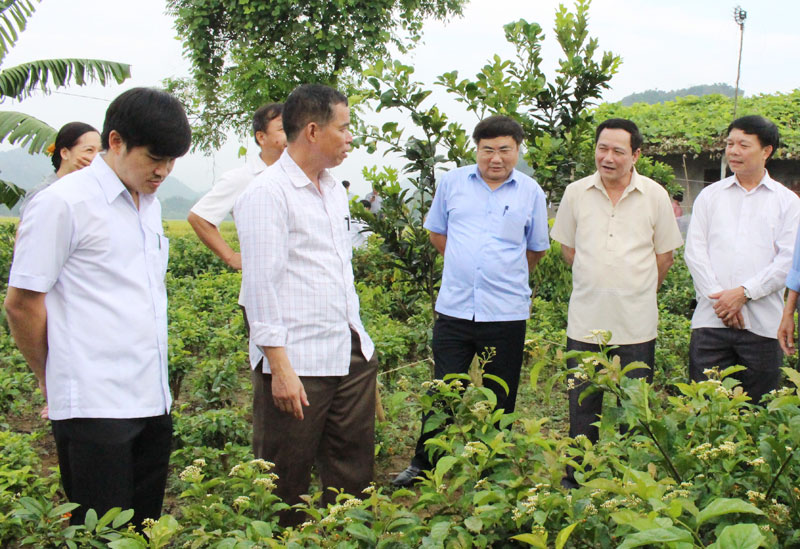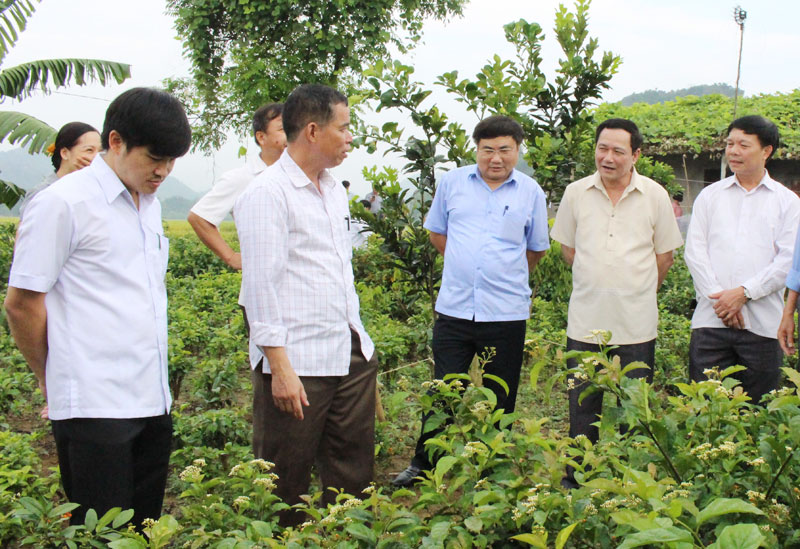
(HBO) – In 2011, celastrus hindsii (family Celastraceae) was first planted by several households in Cao Duong commune, Luong Son district. The plant is known for being used to support treatment of cancers and liver diseases, and improve health. The communal Party Committee has recognized huge demand for the species. The 14th Congress of the communal Party Committee set a target of expanding celastrus hindsii planting areas. After half of the tenure, the plants have proven effective in Cao Duong commune.

Leaders
of departments, sectors and Luong Son district visit celastrus hindsii plant
model in Cao Duong commune.
Cao Duong and Om
Lang are the largest celastrus hindsii planting villages in the commune, with
over 20 hectares. According to villagers, celastrus hindsii is a kind of vine
and shrub plant which is very easy to grow and doesn’t require hard work and
caring skills. It can be planted together with other plants while its price is
stable. Both celastrus hindsii leaves and branches can be used. Each kilogram
of fresh leaves ranges between 4,000 – 5,000 VND, and dry leaves between 18,000
– 20,000 VND. Each hectare of celastrus hindsii generates over 100 million VND
in profit, three times higher than rice growing. Many households in the commune
have been well off thanks to the plant.
Grasping the
market’s demand and ensuring stable consumption of the pant, several facilities
producing celastrus hindsii glue have been established in Cao Duong
commune. Nguyen Thi Tuyet in Dong Bon
village is the pioneer. It takes five kilogrammes of fresh celastrus hindsii and
several medical herbs to produce 100 grams of celastrus hindsii glue, worth
150,000 VND.
Materials to
produce celastrus hindsii glue are carefully selected, Tuyet said, adding that
vacuum packaging helps preserve celastrus hindsii glue for long. User-friendly
celastrus hindsii glue production will be the main orientation of her family.
Over the past
years, celastrus hindsii has proven a key plant in hunger eradication and
poverty reduction, improving locals’ living conditions.
Secretary of the
communal Party Committee Nguyen Van Huong said local authorities are always
worried about measures to expand celastrus hindsii growing area and seek
consumption channels. With over 50 hectares of celastrus hindsii in the
commune, and an annual output of 1,000 tonnes, their worries are understandable.
Local
authorities are actively working with relevant bodies in the district on
registering a brand name for Cao Duong celastrus hindsii, Huong said, adding
that this is a key step in joining the market and expanding consumption
channels to ensure the value of the products.
According to data from the Hoa Binh Provincial Party Committee, the industrial production index for the first six months of 2025 is estimated to have increased by 20% compared to the same period last year. This marks the highest year-on-year growth rate for this period since 2020.
In the first six months of 2025, Hoa Binh province’s export turnover was estimated at 1.145 billion USD, marking an 18.11% increase compared to the same period in 2024. Import turnover was estimated at $ 804 million, a 17.15% increase, which helped the province maintain a positive trade balance.
The lives of the ethnic minority farmers in Tan Lac district have gradually improved thanks to the new directions in agricultural production. This is a testament to the collective strength fostered through the professional associations and groups implemented by various levels of the district’s Farmers’ Union.
With the motto the "product quality comes first,” after nearly one year of establishment and operation, Muong village’s Clean Food Agricultural and Commercial Cooperative, located in Cau Hamlet, Hung Son Commune (Kim Boi district), has launched reputable, high-quality agricultural products to the market that are well-received by consumers. The products such as Muong village’s pork sausage, salt-cured chicken, and salt-cured pork hocks have gradually carved out a place in the market and they are on the path to obtaining the OCOP certification.
In the past, the phrase "bumper harvest, rock-bottom prices" was a familiar refrain for Vietnamese farmers engaged in fragmented, small-scale agriculture. But today, a new spirit is emerging across rural areas of Hoa Binh province - one of collaboration, organisation, and collective economic models that provide a stable foundation for production.
Maintaining growing area codes and packing facility codes in accordance with regulations is a mandatory requirement for agricultural products to be eligible for export. Recently, the Department of Agriculture and Environment of Hoa Binh province has intensified technical supervision of designated farming areas and packing facilities to safeguard the "green passport" that enables its products to access international markets.



